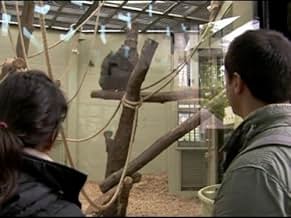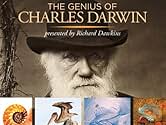Dawkins explores evolution's mechanisms, evidence, and why some reject it. He addresses whether evolved beings must be immoral, agreeing with Darwin that they need not be.Dawkins explores evolution's mechanisms, evidence, and why some reject it. He addresses whether evolved beings must be immoral, agreeing with Darwin that they need not be.Dawkins explores evolution's mechanisms, evidence, and why some reject it. He addresses whether evolved beings must be immoral, agreeing with Darwin that they need not be.
- Awards
- 1 win total
Browse episodes
Featured reviews
If you want to get an understanding about Darwinian Natural Selection and how it works then this is required viewing. Richard is wonderful as always in explaining in a matter of fact way how the process works. It's such a simple process but it's not intuitive and as such is very much misunderstood. Unfortunately it leads to most people thinking it's "survival of the fittest" when it's really about survival in the environment to maturity and ability to reproduce. I cannot recommend this documentary enough. Beautifully produced and directed - it should be shown in every school wherever science taught.
This is a great documentary series from Channel 4, hosted by professor Richard Dawkins, well-known darwinist.
The series mixes segments on the life and discoveries of Charles Darwin, the theory of natural selection and evolution, and Dawkins' attempts at convincing a group of school children that evolution explains the world around us better than any religion.
Most of the story line and the presentation is compelling, and the evidence for evolution is completely overwhelming. This, however, is also what limits the appeal of the series: Dawkins tries a bit too hard - a slightly less argumentative presentation of evolution would probably serve Dawkins' cause better.
The series mixes segments on the life and discoveries of Charles Darwin, the theory of natural selection and evolution, and Dawkins' attempts at convincing a group of school children that evolution explains the world around us better than any religion.
Most of the story line and the presentation is compelling, and the evidence for evolution is completely overwhelming. This, however, is also what limits the appeal of the series: Dawkins tries a bit too hard - a slightly less argumentative presentation of evolution would probably serve Dawkins' cause better.
On the one hand, it's always great to see the rare occurrence of a proud atheist on the television (at least, on this side of the pond...), and it is delightfully refreshing to see someone give no more deference to religious beliefs than any other belief, directly challenging them.
On the other hand, it's frustrating that Dawkins shows us none of the mountain of evidence that we know exists about evolution, and takes on none of the supposed counter-evidence pushed by charlatans.
I think if you have a mini-series documentary, you have an obligation to actually accomplish more than simply state your side, even if it is the right side. You have to actually show evidence. Now, three episodes is hardly enough time to prove anything, but it should be enough to not be easily dismissed. Sadly, that goal is not met.
I saw this because I wanted to see the genius of Charles Darwin, and I feel I didn't see it.
7/10 because this sort of thing is so rare, but no higher because the goal was not met.
On the other hand, it's frustrating that Dawkins shows us none of the mountain of evidence that we know exists about evolution, and takes on none of the supposed counter-evidence pushed by charlatans.
I think if you have a mini-series documentary, you have an obligation to actually accomplish more than simply state your side, even if it is the right side. You have to actually show evidence. Now, three episodes is hardly enough time to prove anything, but it should be enough to not be easily dismissed. Sadly, that goal is not met.
I saw this because I wanted to see the genius of Charles Darwin, and I feel I didn't see it.
7/10 because this sort of thing is so rare, but no higher because the goal was not met.
Episode 1, Dawkins takes a group of school children to task for their sceptical response to his evolution lesson. He then covers some biographical detail surrounding Darwin's voyage of the beagle and draws on modern research into genetics as well as the older fossil evidence to argue convincingly in support of evolution.
In episode 2 Dawkins explores the social implications of Darwinism, he examines the way it was taken and used to justify right wing politics. Competition they argued has been shown to be the natural order, lets copy this model, let the strongest thrive and do not waste your time trying to help the weak, over time a healthier stronger society will emerge and the most able people will thrive. Dawkins who himself had his own book "the selfish gene" misunderstood and exploited rejects this interpretation of Darwinism. He points out the many social aspects in primate behaviour, as well as visiting a group of women looking for sperm donors, kindness it turns out is just as important to them in selecting a mate as health and ability. The episode though doesn't really address the prickly questions out there. Is war and genocide also a result of our biological urges from our evolutionary past? Dawkins doesn't seem to think so but worryingly doesn't really have an argument against this point of view. Evolution, for him, it seems is allowed to take credit for our positive mental attributes but not the negative ones.
Episode 3 goes to pieces, Dawkins appears before creationist after creationist, he refutes their arguments though they carry on regardless, some of them are truly bizarre people and they are by no means all Americans. The people who Dawkins takes on are pretty light weight and I found it odd how their answers would be faded out and narrated over by Dawkins himself who would speak over them in a slightly self-satisfied voice-over. It's comes across as not only unintentionally funny but it also creates the impression that he's trying to shut them up or hide something. Exasperated by the revival of biblical literalism Dawkins next visits the Archbishop of Canterbury who tells Dawkins that he's quite happy with Darwin's ideas and that evolution has proved no real threat to the established church. Dawkins however is equally unsatisfied with this response and races off in his car to see his good friend the philosopher Daniel Dennett. For a man who at times seems to have little patience with philosophers strangely there's a touch of almost reverence in Dawkins voice when he speaks of his friend. Dawkins finishes the episode by using a quote from Darwin to help reinforce his atheist views, he conveniently neglects to mention those occasions when Darwin indicated that science and faith were compatible, such as his letter to Asa Gray, it's naturally left out of the programme of course because it doesn't fit with his agenda.
Overall I thought this was a bit of a missed opportunity for Dawkins to set out what the theory of evolution is, what evidence there is for it, the history of the theory and how it changes of perspective on the natural world and ourselves. Anybody who's read his book Climbing Mount Improbable will be left with no doubt about his skill in explaining complex ideas to the layman. Dawkins knows his stuff and his passion is second to none but unfortunately there's a tendency to go off in tangents. When it comes to episodes two and three you also get the feeling that there's a certain destination that he's determined to arrive at and will make the evidence fit this worldview. Some of the cinematography too is also a little bad, during the interviews the camera seems a bit shaky. Dawkins is also made the real focus of the show rather than Darwin, he clearly sees himself as Darwin's successor, a man on an unstoppable quest for the scientific truth which he in turn will relay back to us. The three episodes are full of shots of Dawkins rather than Darwin, Dawkins walking, Dawkins sitting, Dawkins meeting his fans, Dawkins reading, Dawkins staring into the distance, Dawkins shaking his head & lamenting the fact that the rest of the planet is not as rational as he is. In spite of some the presentational flaws, the subject matter of Darwin's theory is fascinating and Dawkins introduces us to a range of experts. For a complete account of Darwin's life and theory though I'd recommend the BBC's 'Charles Darwin and the Tree of Life.'
In episode 2 Dawkins explores the social implications of Darwinism, he examines the way it was taken and used to justify right wing politics. Competition they argued has been shown to be the natural order, lets copy this model, let the strongest thrive and do not waste your time trying to help the weak, over time a healthier stronger society will emerge and the most able people will thrive. Dawkins who himself had his own book "the selfish gene" misunderstood and exploited rejects this interpretation of Darwinism. He points out the many social aspects in primate behaviour, as well as visiting a group of women looking for sperm donors, kindness it turns out is just as important to them in selecting a mate as health and ability. The episode though doesn't really address the prickly questions out there. Is war and genocide also a result of our biological urges from our evolutionary past? Dawkins doesn't seem to think so but worryingly doesn't really have an argument against this point of view. Evolution, for him, it seems is allowed to take credit for our positive mental attributes but not the negative ones.
Episode 3 goes to pieces, Dawkins appears before creationist after creationist, he refutes their arguments though they carry on regardless, some of them are truly bizarre people and they are by no means all Americans. The people who Dawkins takes on are pretty light weight and I found it odd how their answers would be faded out and narrated over by Dawkins himself who would speak over them in a slightly self-satisfied voice-over. It's comes across as not only unintentionally funny but it also creates the impression that he's trying to shut them up or hide something. Exasperated by the revival of biblical literalism Dawkins next visits the Archbishop of Canterbury who tells Dawkins that he's quite happy with Darwin's ideas and that evolution has proved no real threat to the established church. Dawkins however is equally unsatisfied with this response and races off in his car to see his good friend the philosopher Daniel Dennett. For a man who at times seems to have little patience with philosophers strangely there's a touch of almost reverence in Dawkins voice when he speaks of his friend. Dawkins finishes the episode by using a quote from Darwin to help reinforce his atheist views, he conveniently neglects to mention those occasions when Darwin indicated that science and faith were compatible, such as his letter to Asa Gray, it's naturally left out of the programme of course because it doesn't fit with his agenda.
Overall I thought this was a bit of a missed opportunity for Dawkins to set out what the theory of evolution is, what evidence there is for it, the history of the theory and how it changes of perspective on the natural world and ourselves. Anybody who's read his book Climbing Mount Improbable will be left with no doubt about his skill in explaining complex ideas to the layman. Dawkins knows his stuff and his passion is second to none but unfortunately there's a tendency to go off in tangents. When it comes to episodes two and three you also get the feeling that there's a certain destination that he's determined to arrive at and will make the evidence fit this worldview. Some of the cinematography too is also a little bad, during the interviews the camera seems a bit shaky. Dawkins is also made the real focus of the show rather than Darwin, he clearly sees himself as Darwin's successor, a man on an unstoppable quest for the scientific truth which he in turn will relay back to us. The three episodes are full of shots of Dawkins rather than Darwin, Dawkins walking, Dawkins sitting, Dawkins meeting his fans, Dawkins reading, Dawkins staring into the distance, Dawkins shaking his head & lamenting the fact that the rest of the planet is not as rational as he is. In spite of some the presentational flaws, the subject matter of Darwin's theory is fascinating and Dawkins introduces us to a range of experts. For a complete account of Darwin's life and theory though I'd recommend the BBC's 'Charles Darwin and the Tree of Life.'
Oxford biologist Richard Dawkins -- forthright, candid, firm, but never angry -- confronts religious believers of various types, from grammar school teachers to the Archbishop of Canterbury.
I've always admired the Archbishops of Canterbury. They're cool. In the sixties, the Archbishop had a carefully styled combination haircut blending Eton with the Beatles. This one has a professorial beard and sounds like Roger Moore playing James Bond. Can you imagine the Pope with a pony tail? I'm afraid you won't learn much about the details of Charles Darwin's "theory" of evolution. You learn about Darwin's life and his struggles with his own beliefs, but as Dawkins wanders from Kenya to New York and London, he doesn't tackle the problems that evangelicals keep raising, although the problems themselves have already been solved -- the eye of the octopus and the little tail of the flagellates. That's not Dawkins' goal.
His job is to convince us that religious belief, especially in the Bible, is a lot of nonsense. I agree with everything Dawkins says, almost. As an anthropologist I would have to point out that in science probability never achieves unity. There must always be some slight doubt about what's going on, otherwise science is no longer science. That's why my walls and shelves are decorated with icons representing all sorts of religions -- a mezuza, a crucifix, the dancing Shiva, two unnamed Hindu gods, a statue of Huizilpotchli, and a stone from a Cheyenne sacred circle in Montana. One never knows.
But, as far as the Bible goes, Dawkins has it all over the evangelicals who have created museums in which people and dinosaurs are contemporaries. Dawkins doesn't say so, but the Bible never makes such a claim. The earth is believed to be about 6,000 years old (instead of about four billion) because Bishop Ussher in the 17th century added up all the "begats" in the Bible and determined that the planet was created at 9 AM Oct 3, 4004 BC.
The fact that so many people are fully committed to this delusion suggests the nature of the stone wall that poor Richard Dawkins is batting his head against. How do you challenge an axiom? I wouldn't look to this documentary for a biography of Charles Darwin or for an explicit explanation of how natural selection works. It's pretty brutal, by the way, and you see lions catch antelope in mid air. Yes, it's bleak, Dawkins tell us, before he claims that cut-throat competition and eugenics are a misapplication of Darwin's ideas. Can he be so sure?
He also doesn't address a question that's been lingering in my own mind for some time. Andrew Greeley -- the American sociologist, novelist, and priest -- argued that politics were responsible for less human misery than religious conflicts. We can see the dynamics at work in the Middle East today, if we bother to look and understand. Come to think of it, though, priests aren't exactly in the forefront of the anti-science movement. In the early years of the last century there was Teilhard de Chardin, a French priest, philosopher, and human paleontologist. De Chardin called humans "the thinking part of the earth," with which Dawkins would probably agree. De Chardin also had a hand in many important goings on in human evolution. He was involved in the discovery of (gulp) Piltdown man, for instance.
It may be that religion's hold over us should be loosened, not just because it's contradicted by science but because it's dangerous. "My tribe is honing knives to use against your tribe," as the poet wrote. Yet where would humans be without their myths?
I've always admired the Archbishops of Canterbury. They're cool. In the sixties, the Archbishop had a carefully styled combination haircut blending Eton with the Beatles. This one has a professorial beard and sounds like Roger Moore playing James Bond. Can you imagine the Pope with a pony tail? I'm afraid you won't learn much about the details of Charles Darwin's "theory" of evolution. You learn about Darwin's life and his struggles with his own beliefs, but as Dawkins wanders from Kenya to New York and London, he doesn't tackle the problems that evangelicals keep raising, although the problems themselves have already been solved -- the eye of the octopus and the little tail of the flagellates. That's not Dawkins' goal.
His job is to convince us that religious belief, especially in the Bible, is a lot of nonsense. I agree with everything Dawkins says, almost. As an anthropologist I would have to point out that in science probability never achieves unity. There must always be some slight doubt about what's going on, otherwise science is no longer science. That's why my walls and shelves are decorated with icons representing all sorts of religions -- a mezuza, a crucifix, the dancing Shiva, two unnamed Hindu gods, a statue of Huizilpotchli, and a stone from a Cheyenne sacred circle in Montana. One never knows.
But, as far as the Bible goes, Dawkins has it all over the evangelicals who have created museums in which people and dinosaurs are contemporaries. Dawkins doesn't say so, but the Bible never makes such a claim. The earth is believed to be about 6,000 years old (instead of about four billion) because Bishop Ussher in the 17th century added up all the "begats" in the Bible and determined that the planet was created at 9 AM Oct 3, 4004 BC.
The fact that so many people are fully committed to this delusion suggests the nature of the stone wall that poor Richard Dawkins is batting his head against. How do you challenge an axiom? I wouldn't look to this documentary for a biography of Charles Darwin or for an explicit explanation of how natural selection works. It's pretty brutal, by the way, and you see lions catch antelope in mid air. Yes, it's bleak, Dawkins tell us, before he claims that cut-throat competition and eugenics are a misapplication of Darwin's ideas. Can he be so sure?
He also doesn't address a question that's been lingering in my own mind for some time. Andrew Greeley -- the American sociologist, novelist, and priest -- argued that politics were responsible for less human misery than religious conflicts. We can see the dynamics at work in the Middle East today, if we bother to look and understand. Come to think of it, though, priests aren't exactly in the forefront of the anti-science movement. In the early years of the last century there was Teilhard de Chardin, a French priest, philosopher, and human paleontologist. De Chardin called humans "the thinking part of the earth," with which Dawkins would probably agree. De Chardin also had a hand in many important goings on in human evolution. He was involved in the discovery of (gulp) Piltdown man, for instance.
It may be that religion's hold over us should be loosened, not just because it's contradicted by science but because it's dangerous. "My tribe is honing knives to use against your tribe," as the poet wrote. Yet where would humans be without their myths?
Did you know
- ConnectionsFeatured in Symphony of Science: Our Place in the Cosmos (2009)
Details
- Release date
- Country of origin
- Language
- Also known as
- Гений Чарльза Дарвина
- Production companies
- See more company credits at IMDbPro
- Runtime
- 1h(60 min)
- Color
Contribute to this page
Suggest an edit or add missing content





















